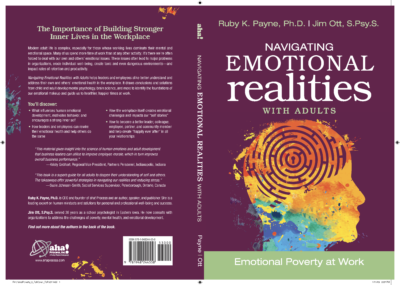 Why do I get along with some people at work so well and with others so poorly?
Why do I get along with some people at work so well and with others so poorly?
Why does it seem like “I could cut the tension with a knife” so often at work?
Why does (insert name of coworker or boss here) drive me crazy?
How can I better understand my work stress so that it doesn’t impact my family life so often?
Why do I sometimes feel like I am a little kid at work, and at other times I hear the voice of my mother or father coming out of my mouth?
I have been doing Emotional Poverty workshops from the time that Emotional Poverty in All Demographics was released. It is a logical fit for my experience as a school psychologist serving families and students for many years. It was during the post-COVID pandemic increase of virtual workshops that I first encountered a situation that would be a part of the story that led to the writing of Navigating Emotional Realities with Adults: Emotional Poverty at Work.
Emotional Poverty in All Demographics and its sequel, Emotional Poverty 2, were written primarily for those who work with children. They were designed to help those serving children and students, from birth to high school age, better understand the neurological development of the kids they serve.
In fall 2020, a client contracted for an Emotional Poverty workshop. When I did the usual pre-conference get-to-know-you call, it became quickly apparent that no one involved with this agency worked directly with children! When the same thing happened with another client a couple of months later, I realized that there was an interest in a version of Emotional Poverty that addressed adults working with adults, both as clients and customers and with each other.
Navigating Emotional Realities (NER) was born out of the recognition that these have been stressful times and that stress is being reflected in the workplace through adult relationship dynamics. Leaning on the understanding of childhood and adolescent social, emotional, and neurological development, NER addresses that knowledge through the lens of how our childhood development continues to impact our adult interactions.
As we say in the book, we all have a “once upon a time” beginning to our story that continues to influence how we deal with the emotional demands of life, including work life. As we better understand our own and others’ stories, we can also better understand our reactions to people and situations we encounter as adults, and we can manage those reactions in ways that are safer and healthier for everyone.
NER is intended for workplace audiences. Addressing workplace relational dynamics through this information can assist in reducing stress, anger, and frustration in the workplace, while hopefully increasing job satisfaction, productivity, and retention. NER has a great deal of scientific information but also includes personal and group activities and ideas as a guide to begin a process of applying good scientific knowledge in practical ways to improve the emotional climate of the workplace and one’s own emotional stability.
These have been stressful times. We have seen it in all parts of our lives, and the workplace has seen the effects, as shown by the appearance of a class of people called “COVID quitters.” I am excited to be a part of offering some thoughts and ideas as an extension of the work Ruby Payne has already done with Emotional Poverty 1 and 2.
Our hope is that this work will help address some of that stress in a positive way and that businesses, schools, service organizations, and any other group of people working closely together will experience an improved work experience.
If you have questions about the book or a potential workshop, please contact aha! Process at info@ahaprocess.com or (800) 424-9484.








